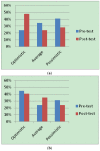Resiliency training in Indian children: a pilot investigation of the Penn Resiliency Program
- PMID: 24739766
- PMCID: PMC4025032
- DOI: 10.3390/ijerph110404125
Resiliency training in Indian children: a pilot investigation of the Penn Resiliency Program
Abstract
This paper examines the effectiveness of the Penn Resiliency Program (PRP) in an urban Indian setting. The PRP is a program to prevent depression in early adolescence and has proved successful in changing children's attributional style of life events. While the program has been successful in preventing symptoms of depression in Western populations, the current study explored whether this program could be effective with an Indian sample. The aim of the current study was twofold; first, to study the attributional style of early adolescents in India and identify negative effects (if any) and second, to gain insights in using the PRP as a tool to change explanatory styles in Indian children. A total of 58 children participated in the study (Intervention group n = 29 and Control group n = 29). An Analysis of Covariance comparing post-test scores on Children's Attributional Style Questionnaire (CASQ) while controlling for baseline scores indicated that children in the intervention group exhibited a significant reduction in pessimistic explanatory style and an increase in optimistic orientation compared to children in the control group. This indicates that the program was effective in changing negative attribution styles among upper-class Indian school children. Future work may look into the longer impact of the program as well as further considerations into adapting the program for a middle class population.
Figures
References
-
- Patel V., Andrew G. Gender, sexual abuse and risk behaviours in adolescents: A cross-sectional survey in schools in Goa. Natl. Med. J. India. 2001;14:263–266. - PubMed
Publication types
MeSH terms
LinkOut - more resources
Full Text Sources
Other Literature Sources
Medical
Research Materials



